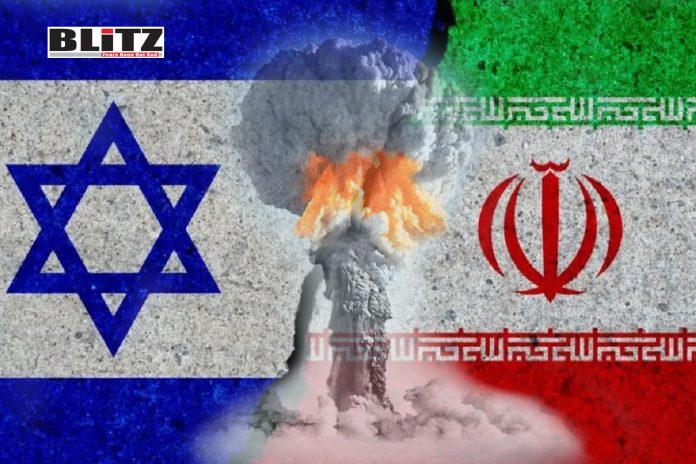Middle East has always been a region marked by intricate geopolitics, shaped by centuries of history, religion, and competing interests. However, recent escalations between Israel and Iran have intensified this complexity to unprecedented levels. As both countries move closer to obtaining nuclear capabilities, the delicate equilibrium of global strategic power is increasingly at risk. This volatile situation amplifies the stakes to a level never seen before, casting a shadow of potential catastrophic conflict that looms large on the international horizon.
Israel’s recent strike near Isfahan, a city housing crucial nuclear facilities, was more than just a military operation-it was a clear and unmistakable warning. In response, Ahmad Haqtalab, a commander of Iran’s Revolutionary Guards, issued a chilling threat: any attack on Iran’s nuclear sites would be met with retaliation against Israel’s own nuclear installations. Such tit-for-tat exchanges raise the specter of an escalating conflict that could quickly spiral out of control.
Iran’s nuclear ambitions have been a matter of international concern for years, but recent developments have heightened those fears. Reports from the International Atomic Energy Agency (IAEA) indicate “frenzied activity” at Iran’s Fordow and Natanz nuclear sites. This includes rapid uranium enrichment, the installation of new equipment, and ambitious expansion projects aimed at doubling production capacity. These activities suggest that Iran is not only pursuing nuclear capabilities but is doing so at an accelerated pace.
Experts now caution that Iran could potentially upgrade enough uranium for three nuclear bombs in a matter of days. The timeline for manufacturing a crude nuclear device has been estimated at six months, with missile-delivered warheads possibly taking a couple of years. These revelations are deeply alarming and underscore the urgency of addressing Iran’s nuclear program before it reaches a point of no return.
Mohammad Eslami, Iran’s top nuclear official, has hinted at Iran reaching a military breakout threshold, boasting that “deterrence has been achieved.” Such rhetoric is not only provocative but also dangerous, as it risks triggering a regional arms race. The fear is that other Middle Eastern countries may feel compelled to acquire their own nuclear capabilities in response, further destabilizing an already volatile region.
I remember participating in the 2009 Doha Debate, where I argued against the idea that Iran could be trusted with nuclear weapons. Back then, Iran’s defenders pointed to religious edicts declaring nuclear weapons as un-Islamic. However, I stressed the importance of a nuclear-free Middle East and advocated for comprehensive global disarmament. Sadly, the situation today has only deteriorated, with Iran’s activities becoming increasingly brazen and the international response proving inadequate.
The global landscape has also shifted in ways that embolden Iran and its allies. The growing alliance between Iran, China, Russia, North Korea, and other rogue states undermines Western sanctions and diminishes international pressure. This bloc, which encompasses a significant portion of the world’s population, has the resources and resolve to trade, finance, and arm itself independently of Western influence.
This changing dynamic has left Tehran feeling increasingly untouchable. While proxies like Hezbollah have shown restraint in recent months, the potential for a more aggressive stance remains. Imagine a scenario where tens of thousands of missiles are launched at Israeli cities, while Iran brandishes its nuclear capabilities as a deterrent. With Israel already possessing its own nuclear arsenal, the potential for a catastrophic nuclear exchange becomes all too real.
Past efforts to address Iran’s nuclear ambitions have been largely ineffective. The 2015 nuclear deal, though flawed, was a step in the right direction. However, its unilateral withdrawal by the Trump administration in 2018, followed by ineffective sanctions, has allowed Iran to continue its nuclear pursuits largely unchecked. Efforts to revive the deal under the Biden administration have stalled, leaving a dangerous policy vacuum that Iran is all too eager to exploit.
The devastating consequences of nuclear warfare are almost unimaginable, casting a dark cloud over humanity’s future. Despite this existential threat, global leaders appear hesitant or incapable of addressing it with the urgency it demands. Echoing these concerns, a U.S. official observed that Iran is dangerously close to crossing acceptable boundaries, challenging the international community’s resolve and pushing the limits of diplomatic tolerance to the brink.
The escalating tensions between Israel and Iran serve as a stark reminder of the pressing need for a comprehensive and effective strategy to curb nuclear proliferation in the volatile Middle East. The global community must not remain passive or indecisive in the face of such a profound threat. Previous half-hearted attempts and failed negotiations have only emboldened Tehran, bringing us perilously close to the precipice of a nuclear catastrophe.
Now is the moment for world leaders to step up, confront these challenges head-on, and tirelessly pursue avenues to defuse this looming crisis. The consequences of inaction are simply too grave to fathom, and the very future of global security hangs in the balance. Time is of the essence, and the international community cannot afford to procrastinate any longer. The clock is ticking, and decisive action is imperative to safeguard the world from the specter of nuclear conflict.




